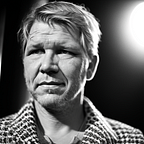Futures Friday: Personal Futures
Note: I like to sprinkle my posts with a little bit of personality, though this week I may be adding a bit more than usual and I hope it can help others find inspiration.
Yesterday I spent several hours flying across the United States to attend the funeral of my Nana. Being locked and strapped into a tin can for six hours gives you some time to think. My Nana lived a very full life and is an important part of who I have become. She outlived my parents and all my other grandparents. Growing up, my immediate family life was, well, less than ideal, and certainly not stable. In contrast, when I would spend summers on the East Coast with my grandparents, I found comfort, teamwork, respect, and forgiveness — a different model of family life. I knew early on that it was not just the love my grandparents had for each other and their children, but the way they shared it that I wanted to emulate. It was not just a nice fuzzy feeling, I craved what they had down to my bones and swore to myself their model would be my future.
Now, I don’t know how much of that vision has lead me to having a very blessed adult life with a family of my own, but for me it was a conscious effort, (every year, every day) to live better, to do better, for my family. Without the example of my grandparents inspiring my own vision of a preferable future, I would probably not be where I am today.
Personal futures is different than professional foresight. We usually do not use the same rigor, scanning, analysis, and formal discipline when we work on our personal futures. However, many of the same skills can be used for both. Here are a few things that I think help me be both a better professional and personal futurist:
1. Never stop looking, never stop dreaming
There is always something new to learn, something more to imagine. This is a critical skill in foresight, being able to see possibilities hiding under a rock that others have missed. When we are surprised by a future, it is usually because we stopped looking. It takes a conscious effort and perseverance to keep at it, but it pays off.
2. Find your preferred visions
Usually our preferred futures are born in part from contrasting other less desirable futures. Other times they may come from a passion or a calling. Sometimes any path seems preferable than the one we are on (a baseline future). Whatever the case, take the time to find your inspiration, a north star.
3. Dare to be different
If futurists are anything, we are different. Those unfamiliar with foresight are not always comfortable with the way futurists think and our methods may seem unfamiliar. Yet it is often in these uncomfortable places that we find the ability to change. It may be a futurist’s willingness to go into uncomfortable and unfamiliar places that gives foresight its unique value.
4. There are no absolute futures, and no one has absolute control
This has been the hardest lesson for me to learn both personally and professionally. Having a vision and a plan to get there are part of a successful strategy, but they should not be so rigid that they break shortly after creating them. I have found that the more I try to shape a future to my original plans, the more I come in conflict with it and it gets away. Futures are slippery things. A vision of the future can be so strong that we do not give it any room to grow within the present. Some clients do not like this part of foresight, it is not definitive. By their very nature, future visions are living visions, they need to be able to change.
5. Be the preferable future for someone else
Sometimes we get so focused on our own visions, we forget that we can be influencers and drivers to others’ futures. We might not always be able to see the effect we have on those around us, but we should not work towards our futures so intently that we do not consider how it will impact others. If we all spend a little more time thinking about these implications before acting, we may find that our own features are actually easier to achieve.
My Nana taught me many things in life (such as poker at age 4). Perhaps none though was more profound than how to fill a household with love and respect, not by words, but by actions. Mentors and teachers come and go in our lives, but if we learn from them, then we carry them into our futures.
